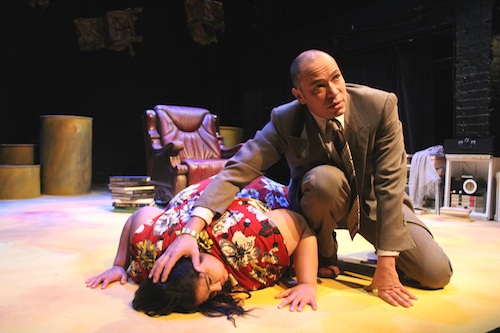 Donna-Michelle St. Bernard’s play Cake, now playing in Toronto, studies the human condition
Donna-Michelle St. Bernard’s play Cake, now playing in Toronto, studies the human condition
Cake is an interesting study of the human condition as it relates to money, power and manipulation.
In the first few moments of Cake, we see Femi (Yolanda Bonnell) come forward into the light. She has a solemn energy and dark, depressing eyes that stir up my own sadness the second she looks my way. Out comes Mabo (Tsholo Khalema), who’s quiet focus is garnished with an endearing sort of twinkle in his look.
The two engage in a sort of replay of what I gather is a traumatic memory of an earthquake. Holding their stomachs in, they’re in pain… I’m not so sure what’s going on yet and twenty minutes later… I’m still not completely sure…
When the show was over, I read the program and saw that Cake was about the illegal activities surrounding the Uranium mines of Niger, Africa. The play would have made a little bit more sense if I had read the program beforehand but not by much.
Maybe I’m just naive but I don’t think a play can be considered complete if it has “required reading”. However, despite being difficult to follow, there were still some elements of Cake that I enjoyed.
The cast of Cake is wonderful. Each actor brings their own special signature while staying connected eternally to each other through every breath. Jamie Robinson as “Oba”, a loud-mouthed business man, pulls off the role with overwhelming fervor and Yolanda Bonnell is particularly captivating as “Femi”, Oba’s sex slave. There is a “syrupy” quality to both her movement and speech that is simply hypnotizing. So, even though I was generally confused at what Cake was actually about, I could still appreciate the performance by the expert cast.
I’ll also mention the set design by Jackie Chau. It is highly imaginative, using the extremely compact Theatre Passe Muraille Backspace to its fullest potential. Downstage is Oba’s living room, with books strewn about the floor and a big leather armchair as the centerpiece. Upstage are huge metal drums, stumps and chairs attached to the walls. I found it to be unexpected, visually interesting and to fit the grunginess and ugliness of the script.
So that’s what worked. What I found didn’t work was the content itself as well as the story or more like… lack thereof? About 20 minutes in, I thought that maybe these people were in hell or possibly on different timelines due to the generally disjointed flow of the script and yes, there is some sort of a storyline, but it’s so thin you almost have to squint to see it. The emotional outbursts (captivating and real as they are) feel like they come out of nowhere and are honestly kind of jarring, especially since we have no story or “stakes” to hold onto.
And hey, maybe there wasn’t supposed to be a story, and if so there should have been some sort of “message” or clear meaning behind the scenes of abuse, sexual assault and extreme rage. Otherwise a show can come off as indulgent and frankly, incomplete. I felt empty inside when it was over and a tiny bit offended, as if I wasn’t allowed into the world of Cake.
I also wouldn’t personally call Cake a play, it was more like a “study”, which isn’t necessarily a bad thing per say. It was an interesting piece to look at and to listen to, it just didn’t feed my soul is all.
Even when there is no clear story line, theatre (like any piece of art) should inspire the viewer or in the very least should be attempting to give the audience a different perspective on the world. Cake didn’t do that for me. Others in the audience may beg to differ (especially those who may have read the program beforehand), but the only thing it inspired in me was a prolonged feeling of discomfort.
Details:
- Cake is playing at the Theatre Passe Muraille Backspace (16 Ryerson Ave.) until December 3rd 2017.
- Shows run Tuesday to Sunday at 7:30 pm with Saturday/Sunday matinees at 2:00 pm.
- Tickets are 33$ (28$ for seniors, 25$ for arts workers and 17$ for under 30) and are available to purchase online or in person at the Theatre Passe Muraille box office before the show.
- This venue is accessible.
Photo of Jamie Robinson and Yolanda Bonnell by Graham Isador.
